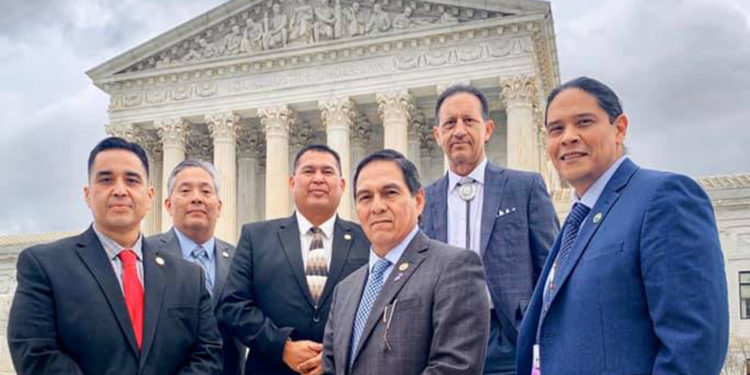By Angel Ellis/Reporter
WASHINGTON–The United States Supreme Court (USSC) has set the McGirt vs. Oklahoma, a case with similar arguments to Murphy Vs. Sharp, has been set for oral arguments. The high court set the hearing for Apr. 21. The case has many interested across Oklahoma. Some of those interested parties have filed briefs in the case.
The MCN, Cherokee Nation, Choctaw Nation and Chickasaw Nation were among several entities submitting briefs to the United States Supreme Court on Feb. 11. The briefs were all provided as impartial advisors on the McGirt appeal case.
The McGirt case is an appeal to the supreme court by Jimcy McGirt, who is currently serving two 500-year sentences and a life without parole sentence for first-degree rape by instrumentation, lewd molestation and forcible sodomy after former convictions of a felony.
According to MCN’s brief, ‘The Muscogee (Creek) Nation (“Nation” or “Creek Nation”) had no role in the genesis of this litigation, but now finds its Reservation under direct attack.’
‘Oklahoma has claimed that the Nation never enjoyed an Indian Territory reservation and that, if it did, the allotment of lands to Nation citizens and the coming of statehood abolished it – despite clear treaty and statutory text to the contrary,’ MCN brief said. ‘The Nation files this brief to vindicate its core sovereign interests in its treaty-guaranteed Reservation.’
This is the second round of legal documents submitted by the tribe and supporters in cases centered on the tribe’s reservation status. In 2018, the tribe awaited the opinion in the Murphy case, a similar land reservation question.
The high court did not render an opinion. Instead, on Dec. 4, 2018, the court directed the parties, Solicitor General and Muscogee (Creek) Nation to submit supplemental briefs addressing two more questions for the court.
McGirt’s case presents the opportunity for all nine justices to hear and give an opinion on the matter. In the last session, Justice Neil Gorsuch did not participate in the Murphy case opinion leaving eight justices to hear the case.
McGirt’s appeal argues that the state did not have the authority to convict him, that federal courts should have handled the jurisdiction due to the fact the crime took place within tribal jurisdiction boundaries.
The question posed in the Murphy case asks the court, ‘Whether the 1866 territorial boundaries of the Creek Nation within the former Indian Territory of eastern Oklahoma constitute an ‘Indian reservation’ today under 18 USC. § 1151(a).’
National Indigenous Women’s Resource Center also submitted a brief on Feb. 11 in support of the tribe’s position.
The summary of the brief states, ‘Regardless of the outcome of this case, the State of Oklahoma will maintain criminal jurisdiction over non-Indian-perpetrated crimes committed within the Creek Nation’s Reservation where the victim is not an Indian.’
‘Oklahoma has claimed that the Nation never enjoyed an Indian Territory reservation and that, if it did, the allotment of lands to Nation citizens and the coming of statehood abolished it – despite clear treaty and statutory text to the contrary,’ MCN brief said. ‘The Nation files this brief to vindicate its core sovereign interests in its treaty-guaranteed Reservation.’
Other briefs filed in support of upholding the reservation status of the MCN came from former Oklahoma state leaders, Brad Henry, Tom Cole, Glenn Coffee, Mike Turpen, Neal McCaleb, Danny Hilliard, Michael Steele, Danial Boren, T.W. Shannon and Lisa Johnson Billy filed as a Brad Henry et. al.
The brief filed by the National Congress of the American Indian support’s points made in the MCN brief.
‘In eight decisions spanning 58 years, this court has articulated the test for determining whether an Indian reservation has been disestablished,’ NCAI brief said.
The briefs in support of upholding the tenth circuit ruling cite clear intent as a prerequisite to disestablishment.
‘Only Congress can divest a reservation of its land and diminish its boundaries,’ and it’s intent to do so must be clear,’ the brief said.





